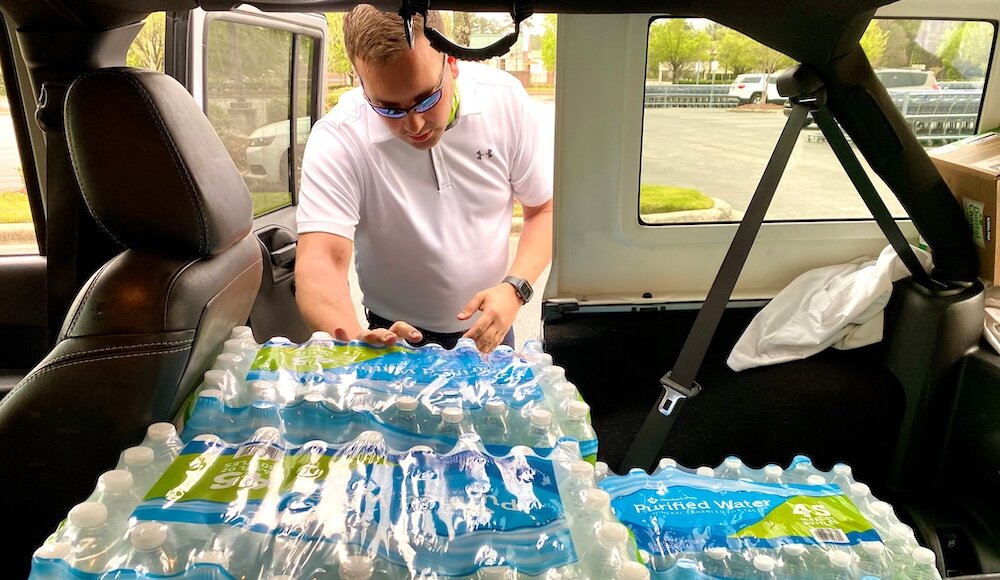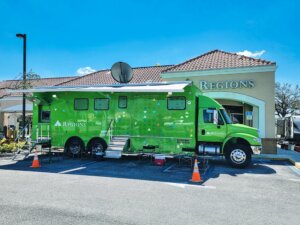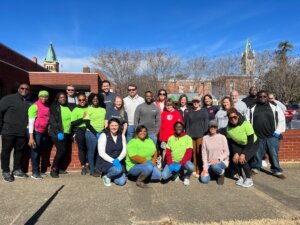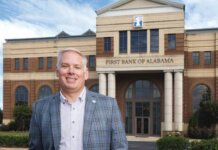
A tornado just raked your town. Your house is a heartbreaking pile of rubble. The power is out and the stores still operating take only cash.
FEMA and the Red Cross are on the way, but in the meantime Regions Bank just pulled up with a branch on wheels, a grill to cook you a burger and free water.
Regions Corp. has a disaster response program that provides a variety of financial and humanitarian services such as loans, grants, fee waivers and boots on the ground when needed.
After storms rolled through the South and Midwest on March 14-15 of this year, bank executives announced a series of disaster-recovery financial services to help people and businesses impacted:
- No check-cashing fees for checks issued by FEMA
- Personal and business loan payment assistance
- Payment deferrals for credit card holders
- Business loan payment deferrals of up to 90 days
- One penalty-free CD withdrawal
- New loan interest rate discounts of up to 0.5%
- Regions Mortgage Disaster Relief Purchase and Renovation loan programs
On a case-by-case basis following disasters, Regions waives ATM surcharges for non-customers and non-Regions ATM fees for Regions customers.
The emergency response program originated around 2005 following one of the South’s worst tragedies.
“I would say it goes back to Hurricane Katrina when the bank took the next step in terms of showing up after a disaster,” explains Jeremy D. King, Regions senior vice president and media and public relations manager.
“There was a lot of onsite service along the Gulf Coast after Katrina struck, and it brought about the need for a couple of enhancements, including having our portable branch facility that we deployed to the markets.”
Each year — and unfortunately with each tornado, hurricane or flood — the program gets better in its response, King says.
“We’re always just trying to evolve based on the needs of our customers and based on the needs of a specific natural disaster,” says John Jordan, head of retail for Regions. “It’s been a very intentional program, and we’ve built it and refined it over many, many years.
“You see tears in the eyes of customers when they feel like they’ve really been given help and support when sometimes things feel really desperate for them,” says Jordan.
In addition to the services listed above, Jordan adds that “we have a special phone line that we’ve built up for people to call with questions about personal loans or credit cards, or lines of credit, or mortgages, or home equity lines of credit.”
The various offers, Jordan says, are for a specific amount of time — typically a few weeks right after the disaster to a few months later.
Even with all that, a friendly face can be the most welcome response in a time of need.
“We find that the greatest difference we can make is just by listening,” Jordan says.
“We’re truly sitting down with a customer and just hearing what they’re going through, asking questions about how the storm has impacted their finances or their livelihood,” he says, “then really leaning into our own experience and our relationships with customers to help them create a financial roadmap for navigating the weeks and months to come.”
Regions employees live and work in these affected communities, Jordan points out, and often know the people impacted.
Besides discounted rates and fees, Regions sends employees to affected areas when the need is there.
“I remember the Tuscaloosa tornado in 2011, and I worked in Birmingham,” recalls Brent Shaffer, Regions’ community engagement manager. “We went and staffed the branches in Tuscaloosa as our associates were dealing with their families and recovering or were volunteering.”
Employee safety is considered, but they will assist when they can.

“You can’t help a good Southerner, a good banker, a good neighbor from getting out there and doing that, so we do,” he says.
“We have cut down trees. We’ve cleaned up school campuses. We’ve put tarps over roofs,” Shaffer says. “We’ve helped our community partners clear out their office after it’s flooded.”
Regions funds the nonprofit Regions Foundation, which offers grants for community work in economic development, workforce readiness and to nonprofits on the front lines of community needs after a disaster.
The bank made a large contribution in 2018 to get its foundation started and continues to contribute.
“Sometimes one of the greatest needs in terms of community development or economic development is recovery after a storm,” says King. “And so over time, the Regions Foundation has emerged as a primary vehicle to be able to fuel that recovery in a very quick and efficient manner.”
In Alabama, they work specifically with the Alabama-Mississippi chapter of the Red Cross “as they’re based here with us to support the partnership we have with them,” Shaffer says.
Opportunities differ with each storm, Shaffer says. In Alabama, they are typically responding to tornadoes but other locations in their 16-state business area might be affected by a hurricane or flood.
In certain cases, they dispatch their rolling bank.
The Portable Branch Facility is based in Hoover and deploys a bank branch on wheels for particularly hard-hit disaster areas, especially if power loss is widespread. The branch includes a customer service area, ATM, 24/7 security, a wheelchair lift and generator power.
“We get that portable bank branch, which is really a full-scale bank branch on wheels, and we deploy it right there into disaster zones,” says Jordan.
Sometimes bank employees deliver water, volunteer to rebuild, or simply listen.
“Consumer banking really draws a type of person who likes to make an impact and to impact people’s lives. It’s certainly part of the culture here at Regions,” Jordan says.
Immediately after a disaster, they talk to local branch managers, community partners and clients to assess needs as quickly as possible. “For the first hours and the first day or two, we’re gathering information and then we make that recommendation of the partners that can best serve following the storm,” says Jordan.
After Hurricane Michael, they visited affected branches in South Alabama and the Florida Panhandle. They went to Helena, Oak Mountain and Jacksonville State after tornadoes there to deliver water and help. The bank launched disaster recovery financial services in Calera and Clanton after the March storms, Baldwin County after Hurricane Sally in September 2020 and the Carolinas following Hurricane Helene.
They took their huge grill to Selma after a 2003 tornado to feed first responders.
“That’s another love language of our associates, I think, is getting in there and feeding those that are doing that chainsaw work,” says Shaffer.
Regions serves customers across the South, Midwest and Texas, and through its subsidiary, Regions Bank, operates approximately 1,250 banking offices and more than 2,000 ATMs.

Keep on serving, with help
On Jan. 12, 2023, workers at Edmundite Missions in Selma were spooning out dinner at their Bosco Nutrition Center, where they serve two meals daily – 342,000 just last year.
Just then, an EF-2 tornado was bearing down on the city of roughly 17,000.
“We pulled everybody that was there and held them tight inside the building,” recalls Missions President and CEO Chad McEachern.
“The tornado came through and devastated us, but we were up and serving dinner that evening knowing that we are the place where folks come to in good times and bad.”
They used grills and generators to keep the food coming.
“We were using flashlights and car headlights to light the way, but we didn’t stop,” McEachern says.
The tornado did millions of dollars’ worth of damage, displaced more than 3,000 people and destroyed a thousand homes, he says, but assistance from the Regions Foundation enabled them to continue their work.
“Regions has been a partner in other ways as well, but this was certainly the most significant donation that they had made,” McEachern says.
Regions is a wonderful partner, he says.
“I often say that when you have partners like Regions, you’re able to do the work that you’re able to do each day knowing that you have folks behind you supporting your work.”
Deborah Storey is a Huntsville-based freelance contributor to Business Alabama.
This article appears in the July 2025 issue of Business Alabama.



